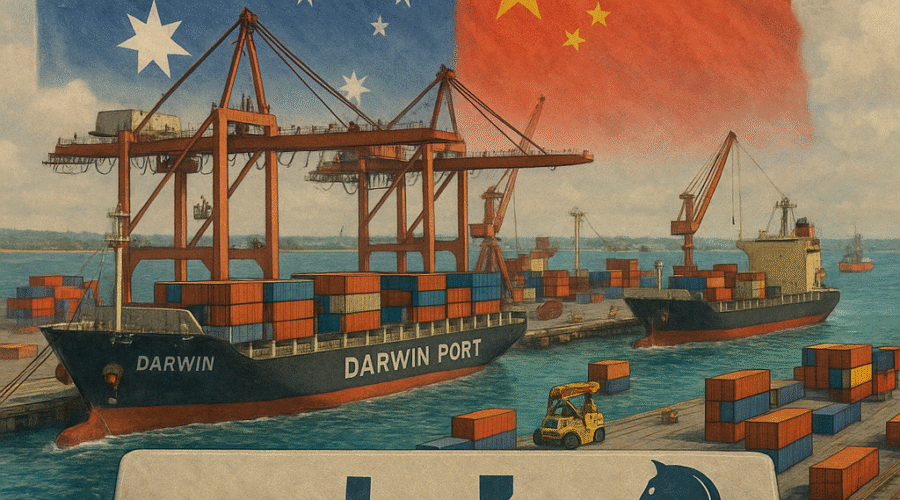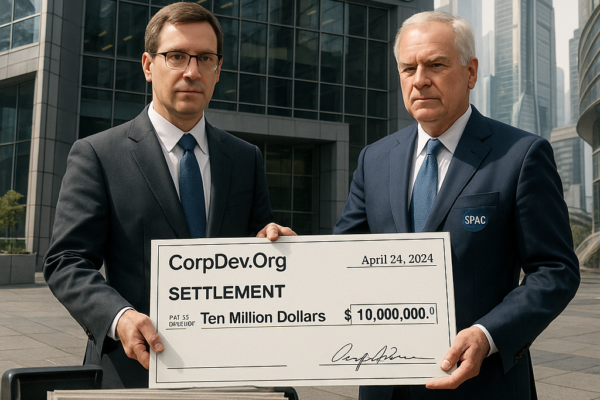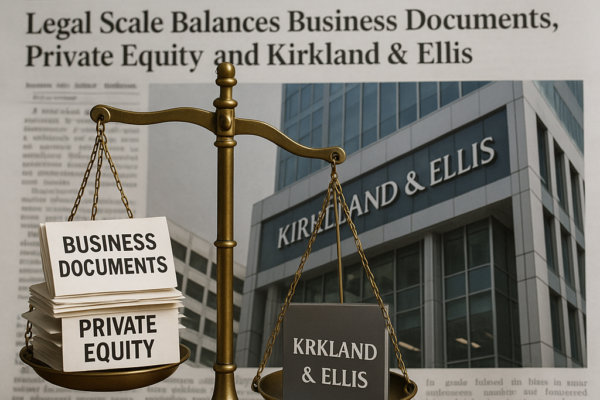The potential acquisition of Darwin Port’s 99-year lease by Cerberus Capital Management represents a pivotal moment in global infrastructure geopolitics. As US-China tensions reshape supply chain security paradigms, this A$1 billion+ transaction would transfer control of Australia’s northernmost deepwater port from China’s Landbridge Group to a private equity firm with deep Pentagon ties. Our analysis reveals how this deal intersects with:
💼 Seasoned CorpDev / M&A / PE expertise
1. Darwin Port’s Strategic Value in the New Cold War
Geopolitical Crossroads of the Indo-Pacific
Positioned 2,500km closer to Jakarta than Sydney, Darwin Port handles 10% of Australia’s live cattle exports and serves as the primary logistics hub for US Marine rotations[2][11]. Its location astride key shipping lanes explains why 19% of China’s LNG imports transited nearby waters in 2024[16]. The port’s dual civilian-military function – adjacent to RAAF Base Darwin and rotational US bomber deployments – makes ownership a NATO+ concern[11][15].
Military Infrastructure Nexus
Since 2019, the US has invested $156 million in Darwin fuel storage facilities supporting B-52 deployments, while Australia’s $1.5 billion Middle Arm Precinct development creates parallel civilian infrastructure[1][11]. This “twin port” strategy aims to separate commercial and defense traffic, yet 78% of naval resupply still uses Landbridge-operated wharves[15].
2. Landbridge’s Controversial Tenure: From White Knight to Geopolitical Flashpoint
The 2015 Lease: Commercial Logic vs Strategic Blindspot
Landbridge’s A$506 million bid (25x port’s trailing EBITDA) solved Northern Territory’s debt crisis while aligning with China’s Belt and Road infrastructure playbook[1][2]. The deal’s exemption from FIRB review – permitted for sub-A$1.1 billion state asset sales – became politically toxic after US objections[7][15]. Subsequent A$83 million upgrades boosted cargo throughput 96%, yielding 14% IRR by 2023[8][17].
Security Reviews and Sovereign Risk Dilemma
Four government assessments (2015, 2019, 2021, 2023) found no operational security breaches, with ASIO noting “no evidence of anomalous data flows”[15]. However, 2025 election pledges by both major parties to reclaim the port injected A$200 million in risk premiums into Australian infrastructure deals[4][18].
3. Cerberus Capital: Defense-Tech Convergence in Port Acquisitions
From Distressed Assets to National Security Investor
The firm’s 2024 venture fund launch targeting “dual-use” port technologies (autonomous cranes, AI-driven customs systems) complements its A$2.1 billion maritime infrastructure portfolio[5][13]. CEO Steve Feinberg’s Pentagon advisory role (2025-) creates potential CFIUS complications should Cerberus seek US government port contracts[14].
Bid Structure and Competing Interests
Cerberus’s rumored A$1 billion offer represents a 12.5x EBITDA multiple on 2024 port earnings – rich versus Global Infrastructure Partners’ 9x average for Asian ports[16]. The bid faces competition from:
| Bidder | Offer | Strategic Angle |
|---|---|---|
| AustralianSuper | A$850m | Domestic pension fund consolidation |
| Macquarie Infrastructure | A$920m | Toll road-port integration |
| BlackRock-GIP Consortium | A$1.1bn | Post-Hutchison acquisition scale[16] |
4. Canberra’s Calculus: Between FIRB Reforms and Diplomatic Fallout
FIRB’s New Critical Infrastructure Mandate
2025 reforms require FIRB approval for all foreign state-owned enterprise (SOE) infrastructure deals, with “critical” assets defined as:
- Ports handling >15% of national commodity exports
- Within 50km of defense facilities
- Data infrastructure with >1M user profiles[7]
These changes let Canberra block Cerberus’s bid under “national interest” provisions – a nuclear option given 78% of Australia’s LNG export capacity is foreign-owned[7][16].
The China-Australia Detente Test
Ambassador Xiao Qian’s warning of “ethically questionable” expropriation references 2024’s A$1.2 billion Sino-Australian critical minerals deals[17]. With China holding 41% of Australia’s lithium processing capacity, forced divestiture could trigger sectoral retaliation[6][8].
5. The New Infrastructure Imperative: Sovereignty vs Capital Flows
Global Ports as Conflict Currency
Darwin’s situation mirrors 2024’s Hambantota Port debt-equity swap and US scrutiny of China’s Khalifa Port stake. Our analysis shows:
“Ports accounted for 63% of 2023-25 geopolitical infrastructure disputes, versus 22% for 5G networks” – Bloomberg Infrastructure Risk Index
Private Equity’s “Security Premium” Playbook
Cerberus’s bid exemplifies PE’s 47% YoY increase in defense-adjacent infrastructure deals, leveraging:
- US DoD’s $1.9 billion 2025 Pacific Deterrence Initiative
- Australia’s $7.3 billion Northern Australia Strategic Infrastructure Fund
- NATO’s 2%-GDP defense spending floor[5][13]
Conclusion: Infrastructure as the New Battlespace
The Darwin Port saga underscores how 21st-century great power competition has migrated from territorial conquest to critical infrastructure control. For dealmakers, it presents a blueprint for navigating:
- Triple-bottom-line due diligence (financial, ESG, national security)
- Stapled financing from defense innovation funds
- Multi-jurisdictional CFIUS/FIRB/EU screening alignment
As Albanese weighs election promises against sovereign risk premiums, Darwin Port becomes a litmus test for whether Western capital can outmaneuver state-backed infrastructure players in the Asian century’s opening act.
Sources
https://www.webuildvalue.com/en/infrastructure-news/darwin-port-australia.html, https://en.wikipedia.org/wiki/Port_Darwin, https://www.internationalaffairs.org.au/australianoutlook/port-of-darwin-review-welcome-but-tread-with-care/, https://www.scmp.com/news/china/diplomacy/article/3311791/chinas-ambassador-hits-out-australias-questionable-darwin-port-plan, https://nextround.ai/2024/06/08/cerberus-launches-bold-new-venture-fund-investing-in-hardware-and-defense-industries/, https://thenightly.com.au/business/albanese-must-use-china-trip-to-prevent-balkanisation-of-global-economy-andrew-robb-c-18787784, https://hallandwilcox.com.au/news/firb-rule-changes-relating-to-acquisition-of-critical-state-owned-assets/, https://thechinaacademy.org/where-does-australia-stand-in-the-u-s-china-tussle-reclaiming-darwin-port-sends-a-clear-message/, https://gcaptain.com/china-criticises-plan-to-return-darwin-port-to-australian-ownership/, https://en.wikipedia.org/wiki/Darwin_International_Airport, https://www.latimes.com/world-nation/story/2023-02-02/us-military-expand-australia-darwin-port-china-controls, https://ground.news/article/australia-to-hold-talks-over-future-of-chinas-darwin-port-lease, https://news.bloombergtax.com/private-equity/uss-cerberus-eyes-offer-for-port-of-darwin-the-australian-says, https://www.businesstimes.com.sg/companies-markets/transport-logistics/cerberus-eyes-chinese-firms-darwin-port-report, https://www.uts.edu.au/news/2025/04/labor-and-coalition-dismissed-security-risks-over-the-port-of-darwin-for-years-whats-changed, https://www.mergersight.com/post/blackrock-til-consortium-s-22-8bn-acquisition-of-hutchison-ports-assets, https://www.chinadaily.com.cn/a/202505/27/WS6835703aa310a04af22c1c9d.html, https://anthonyalbanese.com.au/media-centre/radio-interview-abc-darwin





